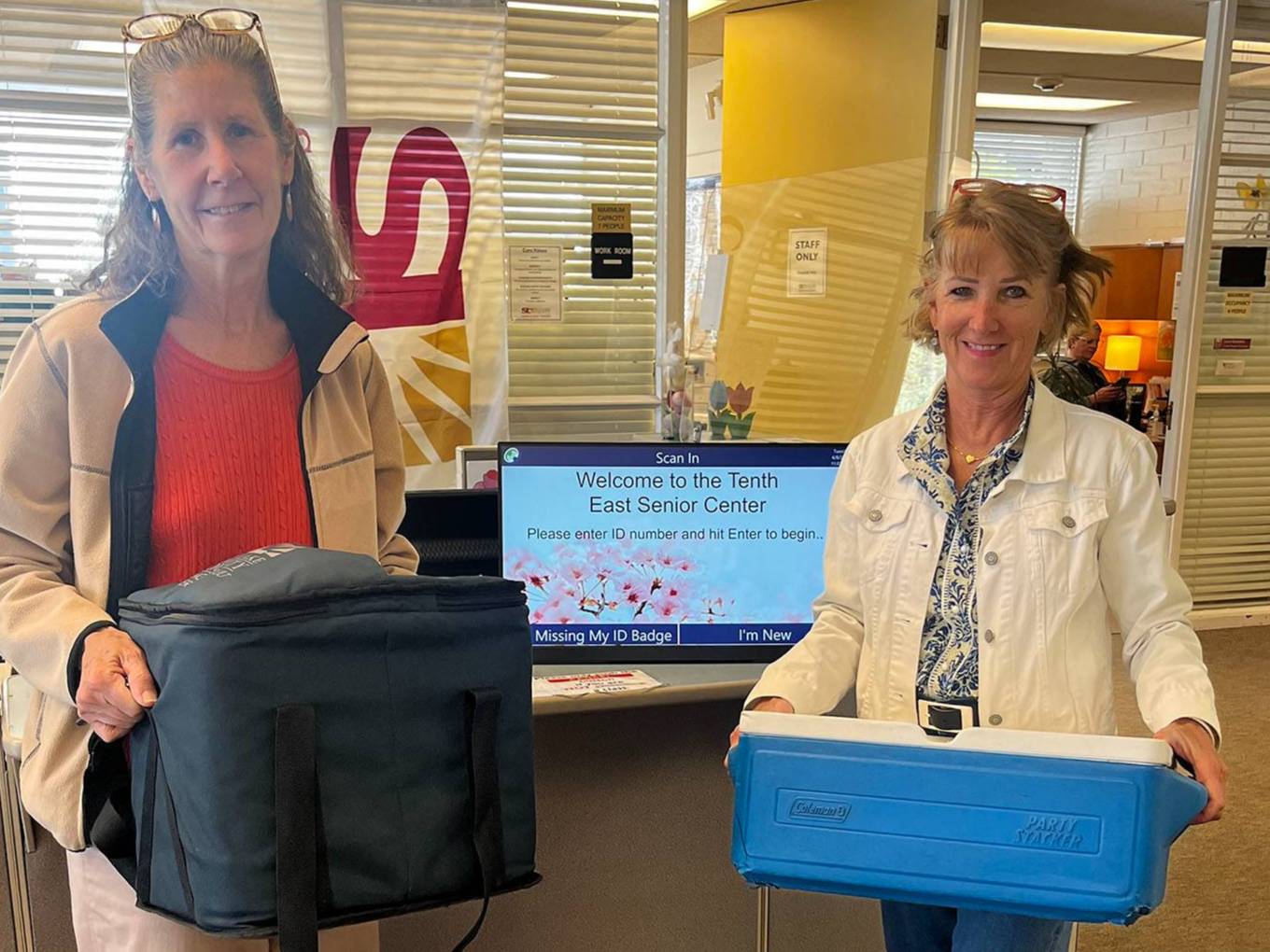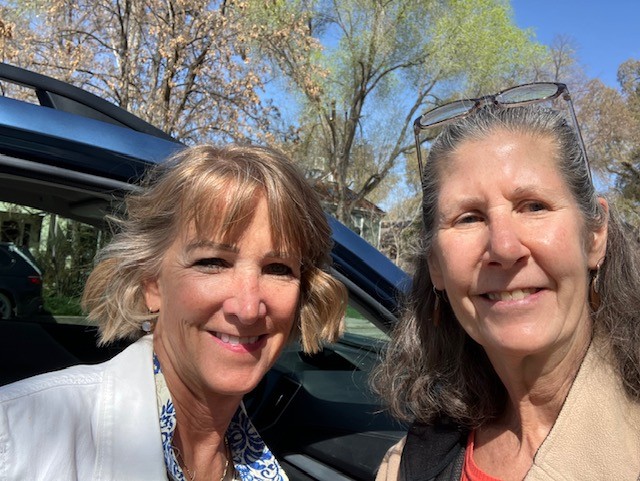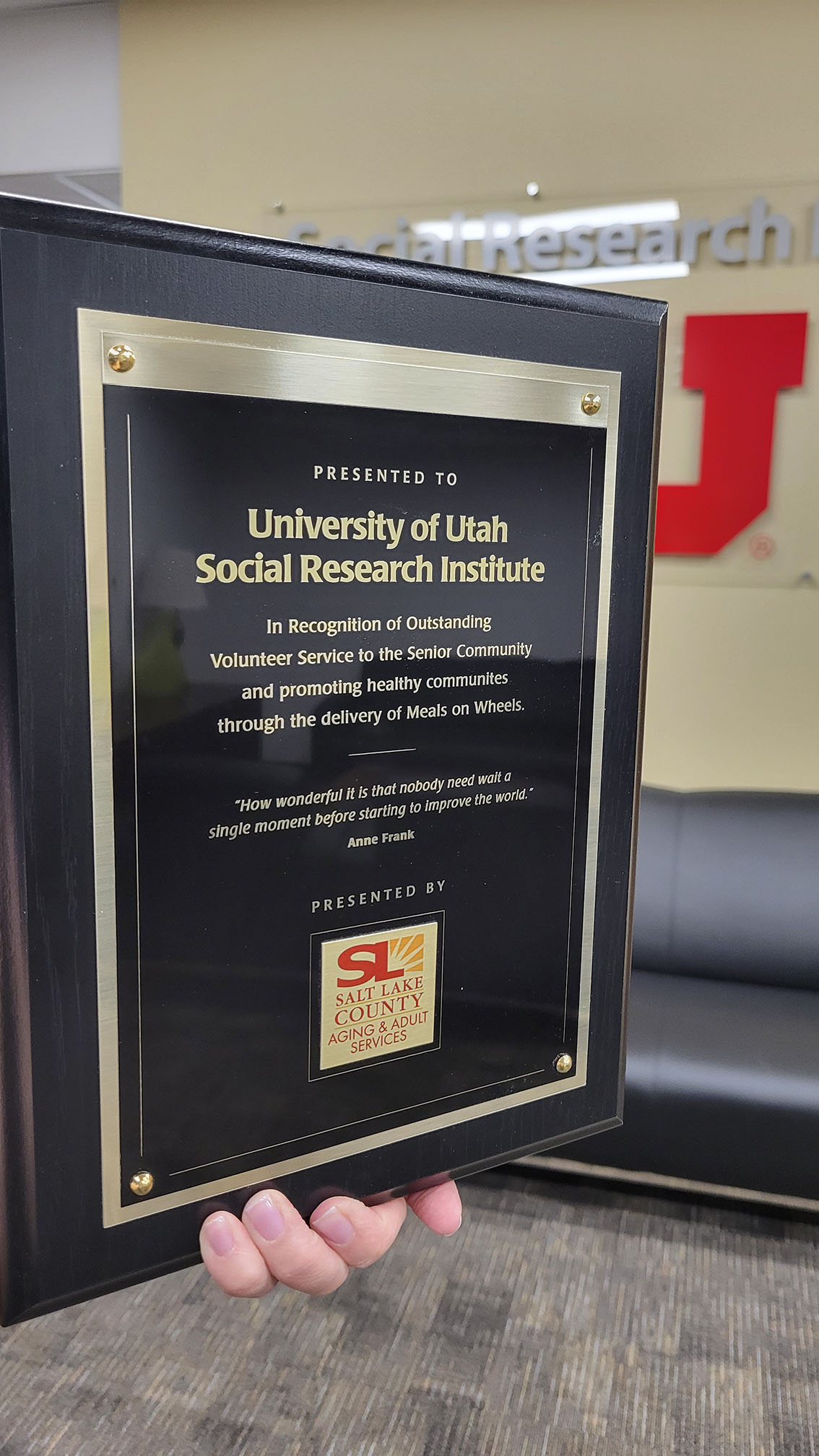A Legacy of Giving Back
Social Work Volunteers Serve Older Adults in the Salt Lake County Meals on Wheels Program

Mary Beth Vogel-Ferguson (left) and Jennifer Zenger (right) picking up meals from the 10th East Senior Center.
In the spring of 2014, Salt Lake County Aging and Adult Services was in a bit of a pinch. They needed a group of reliable volunteers to cover a Meals on Wheels route for the summer—just until a new group of student volunteers could be recruited in the fall. Norma Harris, then director of the College of Social Work’s Social Research Institute (SRI), and Research Associate Professor Mary Beth Vogel-Ferguson spearheaded the volunteer effort within the College of Social Work, rallying a team of faculty and staff to lend a hand delivering meals to older adults in the nearby Avenues neighborhoods.
Eleven years later, faculty and staff volunteers from the College of Social Work are still delivering meals along that same route.
“We just kept doing it. You get attached to folks when you see them a couple times a month. It’s a great way for us to be able to connect with the community,” Vogel-Ferguson said. “The effort gives team members a chance to get out from behind our desks and interact with folks in our community by simply delivering a meal and sharing a smile.”
The Meals on Wheels Program supports isolated and homebound, mostly older adults by delivering nutritious meals directly to their doors. The volunteer process is simple: Volunteers pick up meals from the 10th East Senior Center and deliver them Monday through Friday between 10:00 a.m. and 2:00 p.m. Each shift takes about an hour, with volunteers delivering meals to six to 12 individuals. Depending on availability, volunteers participate anywhere from a couple of times a month to once a week.
“Since the route is right in the Avenues, it is reasonable for volunteers to deliver meals on their lunch breaks. I think people perceive the Avenues as a ‘ritzy’ area, but we’ve delivered to many low-income individuals in this neighborhood. Others just don’t have family members to help them. So, this program ensures that they get at least one balanced, nutritious meal a day,” Vogel-Ferguson said.
| If you are interested in becoming a volunteer for the Meals on Wheels Program on the Avenues route, please contact Jennifer Zenger (jennifer.zenger@utah.edu) to start the application process. Anyone is eligible to volunteer with this team. A background check and brief training are required. |
A key but less visible aspect of the Meals on Wheels Program is the wellness checks that accompany each delivery. Salt Lake County asks volunteers to assess and report the recipient’s condition at the time of the meal drop-off. If an older adult appears incoherent, injured, or in distress, volunteers can log a condition change in the county’s smartphone app, prompting a caseworker to follow up and ensure the individual receives the necessary support. “The app has been really helpful because it provides directions for my delivery route and makes reporting condition changes easy,” said Jennifer Zenger, who has been the project administrator for SRI for nearly 25 years and a Meals on Wheels volunteer since the beginning.
“It’s not like every time you go out, you’re encountering all of these challenges. It happens rarely, which is good. But when it does happen, it’s really good that we’re there,” Vogel-Ferguson said.

Jennifer Zenger took over leadership of the Meals on Wheels team after former leader Mary Beth Vogel-Ferguson retired.
On a typical visit, Vogel-Ferguson says simply being a friendly face goes a long way for the delivery recipients. “For a lot of these folks, they don’t have a lot of interactions with others. So, being positive and asking them how their day is going or commenting that their lunch looks good are a few ways I approach the deliveries.”
Assistant Professor (Clinical) Sumiko Anderson has been a volunteer with Meals on Wheels for nearly four years. When she started working as a full-time faculty at the College of Social Work, Anderson learned about the volunteer opportunity through Vogel-Ferguson. “Any opportunity to serve the community and to be supportive is a part of who I am. It was an easy answer when she asked. It was definitely a ‘yes.’ ‘One hundred percent, yes,’” Anderson said.
Anderson has met former educators from the University of Utah, local schoolteachers, poets, and more through the program. “I always try to make some time to just check in with people to see how they’re doing. In doing so, I have learned so much interesting information about people and their backgrounds; I’ve met people of all walks of life which is rewarding for me and them, too,” she said. “They ask me questions about my background, where I grew up, and my children, so we get to know each other on a deeper level.”
A few months ago, while delivering meals, Anderson arrived at the home of an 80-year-old woman she calls "Minnie" (not her real name) and immediately noticed something was wrong. “She had tears in her eyes, and I asked her if she was okay. She said, ‘No, I’m not,’” Anderson recalled. “She explained that somebody scared her into giving them her credit card information over the phone,” she said. Fortunately, Minnie called her credit card company because she felt uneasy about the phone call, and they put a hold on her account.
The next time Anderson delivered a meal to Minnie, she brought a list of community resources, including Adult Protective Services, a senior companionship program, and more local agencies with their contact information. On this delivery, she learned that Minnie’s husband, also a meal recipient, had recently passed away.
“I asked Minnie if she had any family or friends. She introduced me to her friend who lived in the same apartment complex, and I just thanked them for being supportive of her because now she’s alone,” Anderson said. “I’m not a very ‘touchy feely’ person, but I could tell Minnie needed a hug and I asked her if it was okay and she said, ‘yes, please.’ I gave her a big hug that day.”
"I think it's really important for us to stay in community with people of all ages, especially older adults. Sharing their stories is a way for them to remember the sense of purpose they once had, which matters because isolated people often don't feel like they really matter or make a difference."
 For Anderson, service in the Meals on Wheels Program goes beyond simply dropping off
a lunch. “I worry about them, and I can tell the ones who have been more isolated
because the conversations with them are very deep and rich, and they’re usually the
ones that always want me to stay a little longer,” she said. “I think it’s really
important for us to stay in community with people of all ages, especially older adults.
Sharing their stories is a way for them to remember the sense of purpose they once
had, which matters because isolated people often don’t feel like they really matter
or make a difference.”
For Anderson, service in the Meals on Wheels Program goes beyond simply dropping off
a lunch. “I worry about them, and I can tell the ones who have been more isolated
because the conversations with them are very deep and rich, and they’re usually the
ones that always want me to stay a little longer,” she said. “I think it’s really
important for us to stay in community with people of all ages, especially older adults.
Sharing their stories is a way for them to remember the sense of purpose they once
had, which matters because isolated people often don’t feel like they really matter
or make a difference.”
Recently, the volunteer team was awarded with a plaque from Salt Lake County in recognition of “outstanding volunteer service to the senior community and promoting healthy communities.” Vogel-Ferguson notes that the program makes volunteers feel they are in community not only with the people they serve, but also with each other in their jobs on campus. “Sometimes when you're sitting at your desk in the College of Social Work all day long, you don't feel a whole lot like a social worker. …We connect with each other because we have these clients in common,” she said.
Today, volunteers include faculty and staff throughout the College. Vogel-Ferguson retired this past December and Zenger took over leadership of the team. “It just gives you a warm fuzzy [feeling] knowing that you said hello, put a smile on their face, and you know they’re alive and well and they're going to have a hot meal,” Zenger said.
